Globalization Case Study: France's Veil Ban and Gwich'in Resistance
VerifiedAdded on 2023/05/26
|6
|1496
|226
Essay
AI Summary
This essay examines the multifaceted impacts of globalization through two distinct case studies: the law in France banning face veils in public and the cultural resistance of the Gwich'in indigenous people to global capitalism. The French law, enacted in 2010, sparked controversy, with proponents citing security concerns and opponents arguing for religious freedom. The Gwich'in, an indigenous community in North America, resist global capitalism to protect their environment, cultural practices, and way of life from the perceived negative impacts of resource exploitation and policy manipulation by developed nations. Both cases illustrate how globalization intersects with culture, politics, and economics, influencing societies worldwide, with Desklib offering further resources for students exploring these topics.
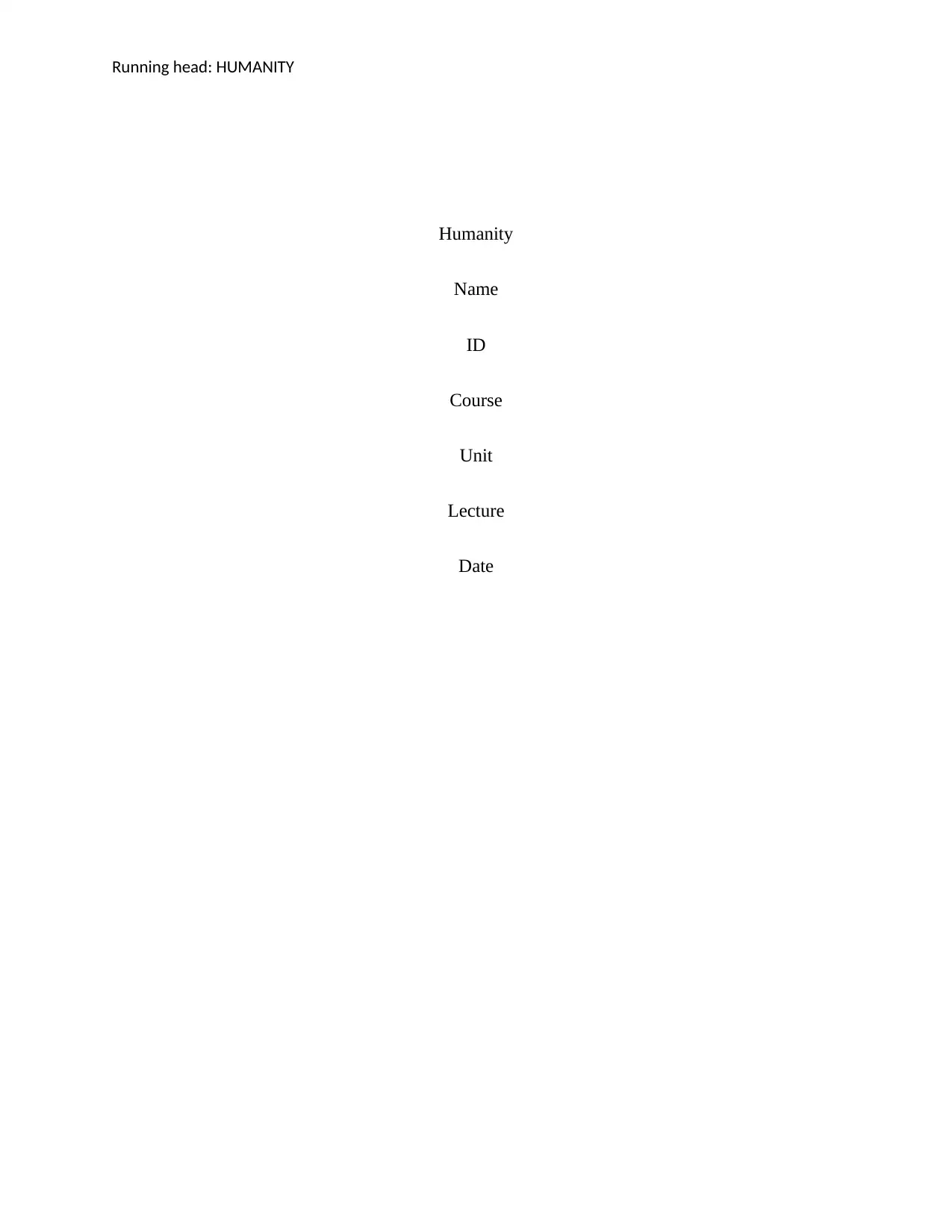
Running head: HUMANITY
Humanity
Name
ID
Course
Unit
Lecture
Date
Humanity
Name
ID
Course
Unit
Lecture
Date
Paraphrase This Document
Need a fresh take? Get an instant paraphrase of this document with our AI Paraphraser
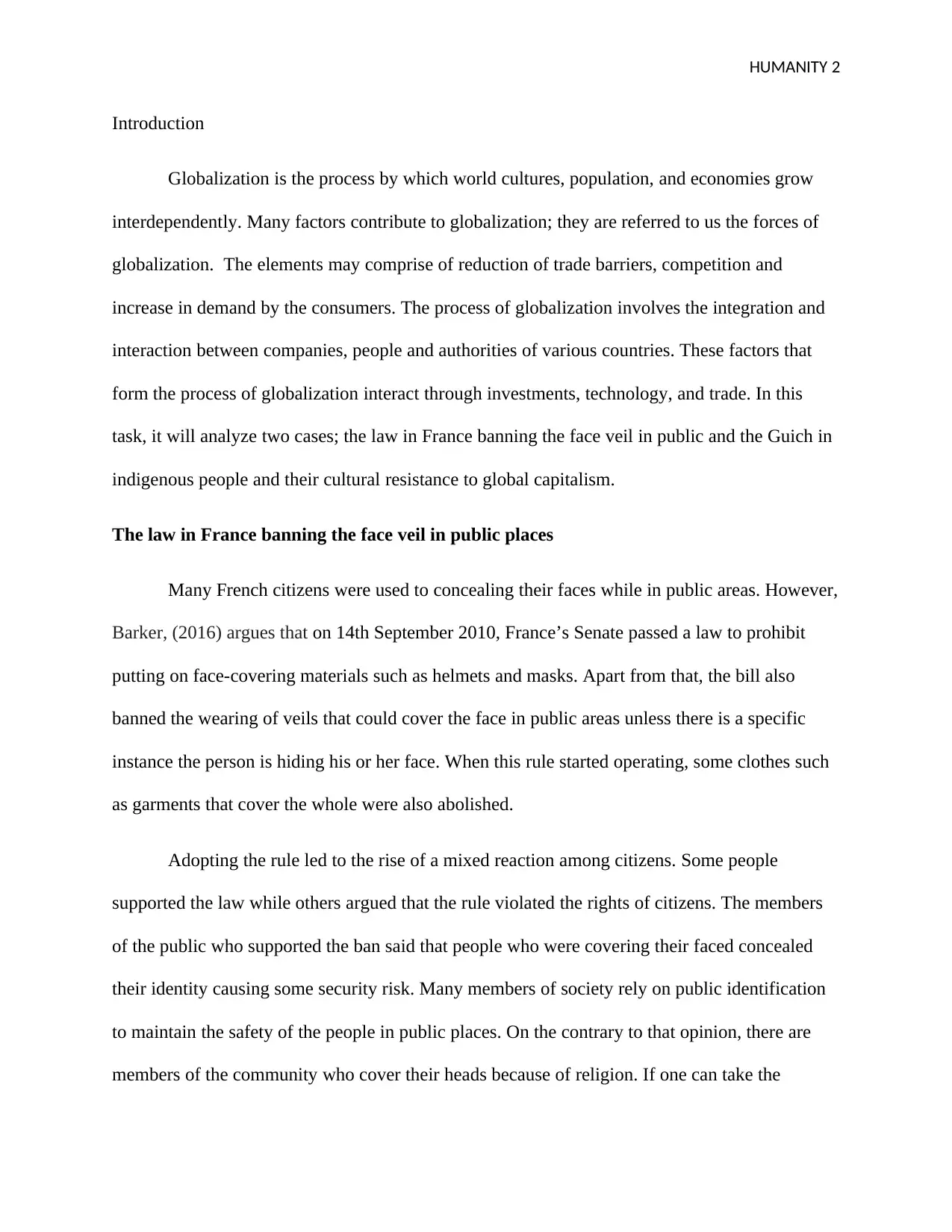
HUMANITY 2
Introduction
Globalization is the process by which world cultures, population, and economies grow
interdependently. Many factors contribute to globalization; they are referred to us the forces of
globalization. The elements may comprise of reduction of trade barriers, competition and
increase in demand by the consumers. The process of globalization involves the integration and
interaction between companies, people and authorities of various countries. These factors that
form the process of globalization interact through investments, technology, and trade. In this
task, it will analyze two cases; the law in France banning the face veil in public and the Guich in
indigenous people and their cultural resistance to global capitalism.
The law in France banning the face veil in public places
Many French citizens were used to concealing their faces while in public areas. However,
Barker, (2016) argues that on 14th September 2010, France’s Senate passed a law to prohibit
putting on face-covering materials such as helmets and masks. Apart from that, the bill also
banned the wearing of veils that could cover the face in public areas unless there is a specific
instance the person is hiding his or her face. When this rule started operating, some clothes such
as garments that cover the whole were also abolished.
Adopting the rule led to the rise of a mixed reaction among citizens. Some people
supported the law while others argued that the rule violated the rights of citizens. The members
of the public who supported the ban said that people who were covering their faced concealed
their identity causing some security risk. Many members of society rely on public identification
to maintain the safety of the people in public places. On the contrary to that opinion, there are
members of the community who cover their heads because of religion. If one can take the
Introduction
Globalization is the process by which world cultures, population, and economies grow
interdependently. Many factors contribute to globalization; they are referred to us the forces of
globalization. The elements may comprise of reduction of trade barriers, competition and
increase in demand by the consumers. The process of globalization involves the integration and
interaction between companies, people and authorities of various countries. These factors that
form the process of globalization interact through investments, technology, and trade. In this
task, it will analyze two cases; the law in France banning the face veil in public and the Guich in
indigenous people and their cultural resistance to global capitalism.
The law in France banning the face veil in public places
Many French citizens were used to concealing their faces while in public areas. However,
Barker, (2016) argues that on 14th September 2010, France’s Senate passed a law to prohibit
putting on face-covering materials such as helmets and masks. Apart from that, the bill also
banned the wearing of veils that could cover the face in public areas unless there is a specific
instance the person is hiding his or her face. When this rule started operating, some clothes such
as garments that cover the whole were also abolished.
Adopting the rule led to the rise of a mixed reaction among citizens. Some people
supported the law while others argued that the rule violated the rights of citizens. The members
of the public who supported the ban said that people who were covering their faced concealed
their identity causing some security risk. Many members of society rely on public identification
to maintain the safety of the people in public places. On the contrary to that opinion, there are
members of the community who cover their heads because of religion. If one can take the
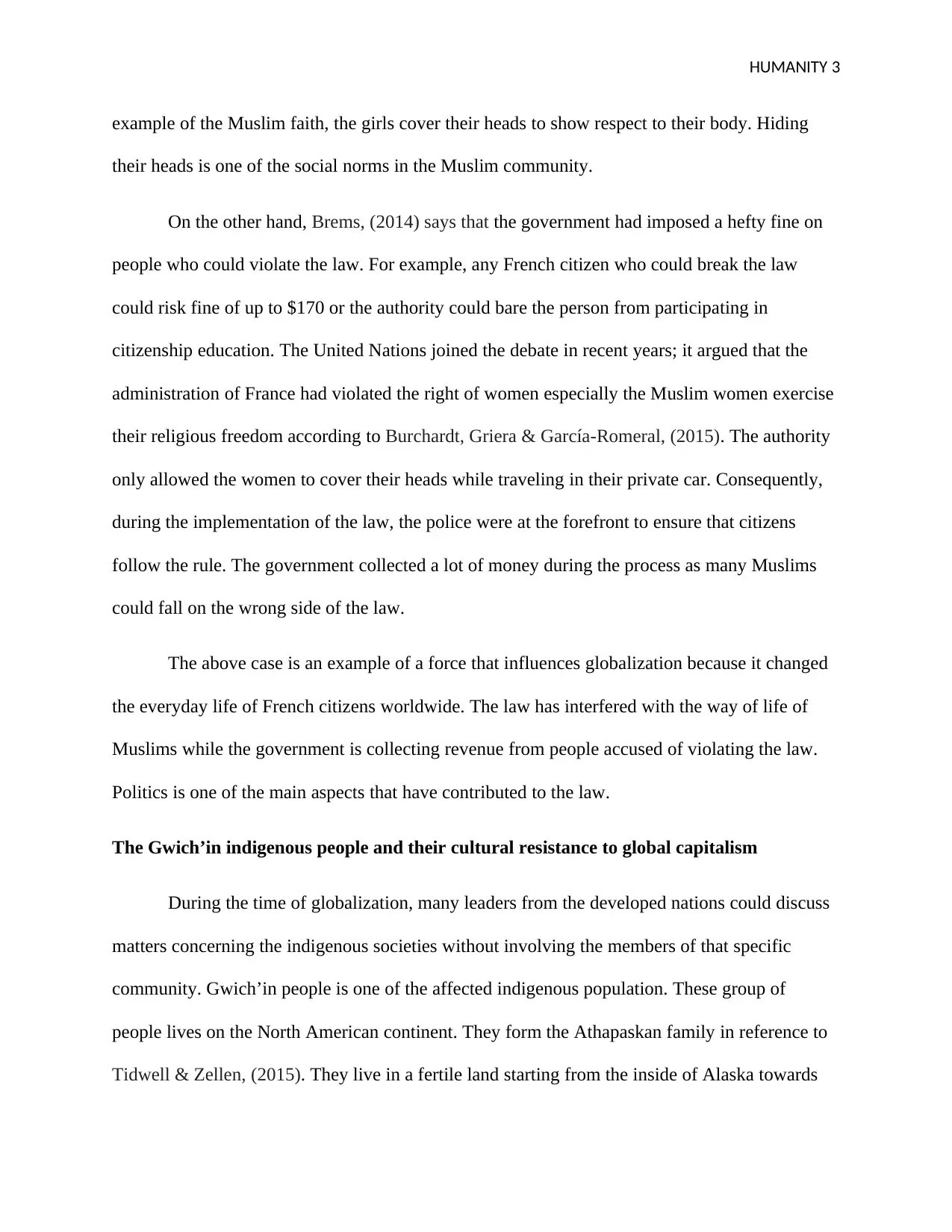
HUMANITY 3
example of the Muslim faith, the girls cover their heads to show respect to their body. Hiding
their heads is one of the social norms in the Muslim community.
On the other hand, Brems, (2014) says that the government had imposed a hefty fine on
people who could violate the law. For example, any French citizen who could break the law
could risk fine of up to $170 or the authority could bare the person from participating in
citizenship education. The United Nations joined the debate in recent years; it argued that the
administration of France had violated the right of women especially the Muslim women exercise
their religious freedom according to Burchardt, Griera & García-Romeral, (2015). The authority
only allowed the women to cover their heads while traveling in their private car. Consequently,
during the implementation of the law, the police were at the forefront to ensure that citizens
follow the rule. The government collected a lot of money during the process as many Muslims
could fall on the wrong side of the law.
The above case is an example of a force that influences globalization because it changed
the everyday life of French citizens worldwide. The law has interfered with the way of life of
Muslims while the government is collecting revenue from people accused of violating the law.
Politics is one of the main aspects that have contributed to the law.
The Gwich’in indigenous people and their cultural resistance to global capitalism
During the time of globalization, many leaders from the developed nations could discuss
matters concerning the indigenous societies without involving the members of that specific
community. Gwich’in people is one of the affected indigenous population. These group of
people lives on the North American continent. They form the Athapaskan family in reference to
Tidwell & Zellen, (2015). They live in a fertile land starting from the inside of Alaska towards
example of the Muslim faith, the girls cover their heads to show respect to their body. Hiding
their heads is one of the social norms in the Muslim community.
On the other hand, Brems, (2014) says that the government had imposed a hefty fine on
people who could violate the law. For example, any French citizen who could break the law
could risk fine of up to $170 or the authority could bare the person from participating in
citizenship education. The United Nations joined the debate in recent years; it argued that the
administration of France had violated the right of women especially the Muslim women exercise
their religious freedom according to Burchardt, Griera & García-Romeral, (2015). The authority
only allowed the women to cover their heads while traveling in their private car. Consequently,
during the implementation of the law, the police were at the forefront to ensure that citizens
follow the rule. The government collected a lot of money during the process as many Muslims
could fall on the wrong side of the law.
The above case is an example of a force that influences globalization because it changed
the everyday life of French citizens worldwide. The law has interfered with the way of life of
Muslims while the government is collecting revenue from people accused of violating the law.
Politics is one of the main aspects that have contributed to the law.
The Gwich’in indigenous people and their cultural resistance to global capitalism
During the time of globalization, many leaders from the developed nations could discuss
matters concerning the indigenous societies without involving the members of that specific
community. Gwich’in people is one of the affected indigenous population. These group of
people lives on the North American continent. They form the Athapaskan family in reference to
Tidwell & Zellen, (2015). They live in a fertile land starting from the inside of Alaska towards
⊘ This is a preview!⊘
Do you want full access?
Subscribe today to unlock all pages.

Trusted by 1+ million students worldwide
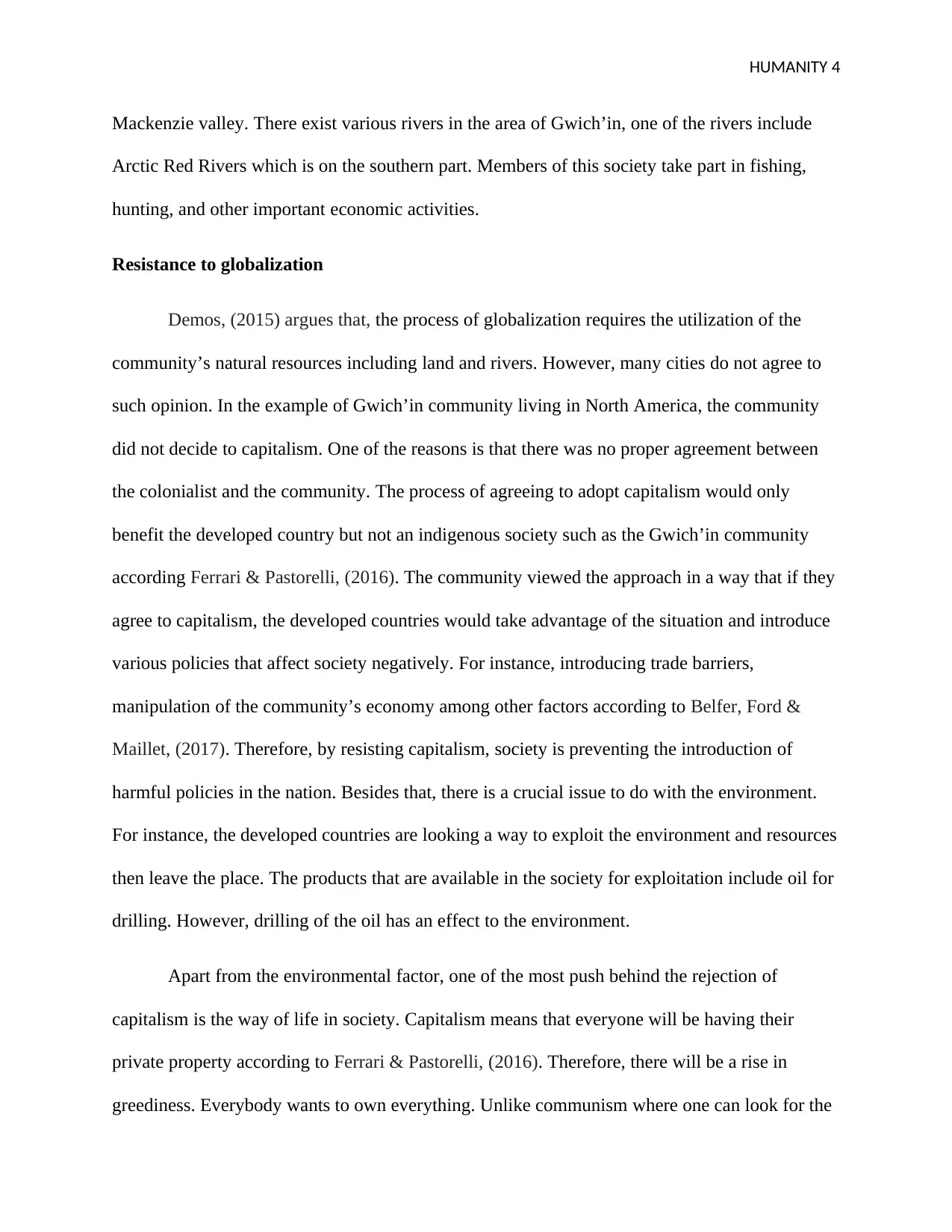
HUMANITY 4
Mackenzie valley. There exist various rivers in the area of Gwich’in, one of the rivers include
Arctic Red Rivers which is on the southern part. Members of this society take part in fishing,
hunting, and other important economic activities.
Resistance to globalization
Demos, (2015) argues that, the process of globalization requires the utilization of the
community’s natural resources including land and rivers. However, many cities do not agree to
such opinion. In the example of Gwich’in community living in North America, the community
did not decide to capitalism. One of the reasons is that there was no proper agreement between
the colonialist and the community. The process of agreeing to adopt capitalism would only
benefit the developed country but not an indigenous society such as the Gwich’in community
according Ferrari & Pastorelli, (2016). The community viewed the approach in a way that if they
agree to capitalism, the developed countries would take advantage of the situation and introduce
various policies that affect society negatively. For instance, introducing trade barriers,
manipulation of the community’s economy among other factors according to Belfer, Ford &
Maillet, (2017). Therefore, by resisting capitalism, society is preventing the introduction of
harmful policies in the nation. Besides that, there is a crucial issue to do with the environment.
For instance, the developed countries are looking a way to exploit the environment and resources
then leave the place. The products that are available in the society for exploitation include oil for
drilling. However, drilling of the oil has an effect to the environment.
Apart from the environmental factor, one of the most push behind the rejection of
capitalism is the way of life in society. Capitalism means that everyone will be having their
private property according to Ferrari & Pastorelli, (2016). Therefore, there will be a rise in
greediness. Everybody wants to own everything. Unlike communism where one can look for the
Mackenzie valley. There exist various rivers in the area of Gwich’in, one of the rivers include
Arctic Red Rivers which is on the southern part. Members of this society take part in fishing,
hunting, and other important economic activities.
Resistance to globalization
Demos, (2015) argues that, the process of globalization requires the utilization of the
community’s natural resources including land and rivers. However, many cities do not agree to
such opinion. In the example of Gwich’in community living in North America, the community
did not decide to capitalism. One of the reasons is that there was no proper agreement between
the colonialist and the community. The process of agreeing to adopt capitalism would only
benefit the developed country but not an indigenous society such as the Gwich’in community
according Ferrari & Pastorelli, (2016). The community viewed the approach in a way that if they
agree to capitalism, the developed countries would take advantage of the situation and introduce
various policies that affect society negatively. For instance, introducing trade barriers,
manipulation of the community’s economy among other factors according to Belfer, Ford &
Maillet, (2017). Therefore, by resisting capitalism, society is preventing the introduction of
harmful policies in the nation. Besides that, there is a crucial issue to do with the environment.
For instance, the developed countries are looking a way to exploit the environment and resources
then leave the place. The products that are available in the society for exploitation include oil for
drilling. However, drilling of the oil has an effect to the environment.
Apart from the environmental factor, one of the most push behind the rejection of
capitalism is the way of life in society. Capitalism means that everyone will be having their
private property according to Ferrari & Pastorelli, (2016). Therefore, there will be a rise in
greediness. Everybody wants to own everything. Unlike communism where one can look for the
Paraphrase This Document
Need a fresh take? Get an instant paraphrase of this document with our AI Paraphraser
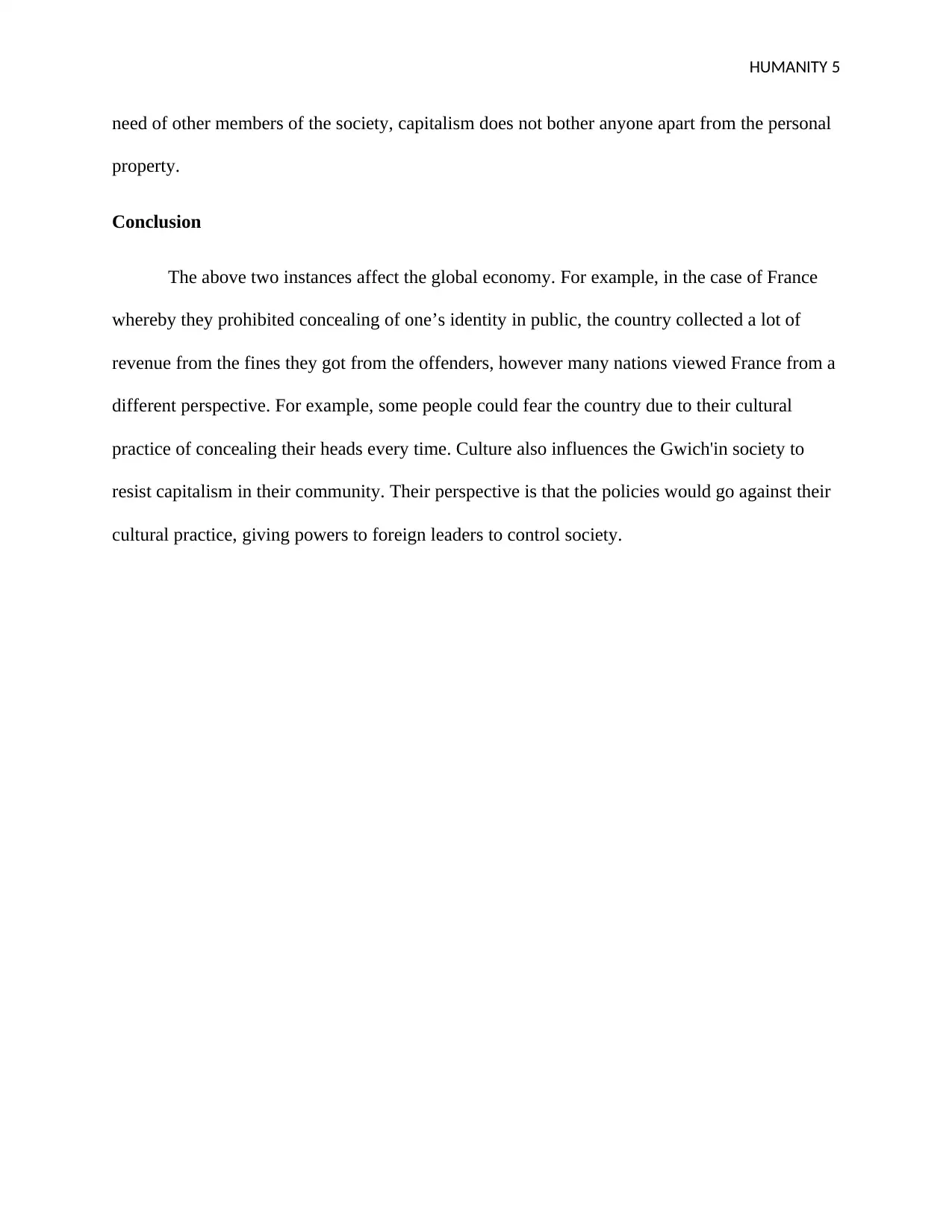
HUMANITY 5
need of other members of the society, capitalism does not bother anyone apart from the personal
property.
Conclusion
The above two instances affect the global economy. For example, in the case of France
whereby they prohibited concealing of one’s identity in public, the country collected a lot of
revenue from the fines they got from the offenders, however many nations viewed France from a
different perspective. For example, some people could fear the country due to their cultural
practice of concealing their heads every time. Culture also influences the Gwich'in society to
resist capitalism in their community. Their perspective is that the policies would go against their
cultural practice, giving powers to foreign leaders to control society.
need of other members of the society, capitalism does not bother anyone apart from the personal
property.
Conclusion
The above two instances affect the global economy. For example, in the case of France
whereby they prohibited concealing of one’s identity in public, the country collected a lot of
revenue from the fines they got from the offenders, however many nations viewed France from a
different perspective. For example, some people could fear the country due to their cultural
practice of concealing their heads every time. Culture also influences the Gwich'in society to
resist capitalism in their community. Their perspective is that the policies would go against their
cultural practice, giving powers to foreign leaders to control society.
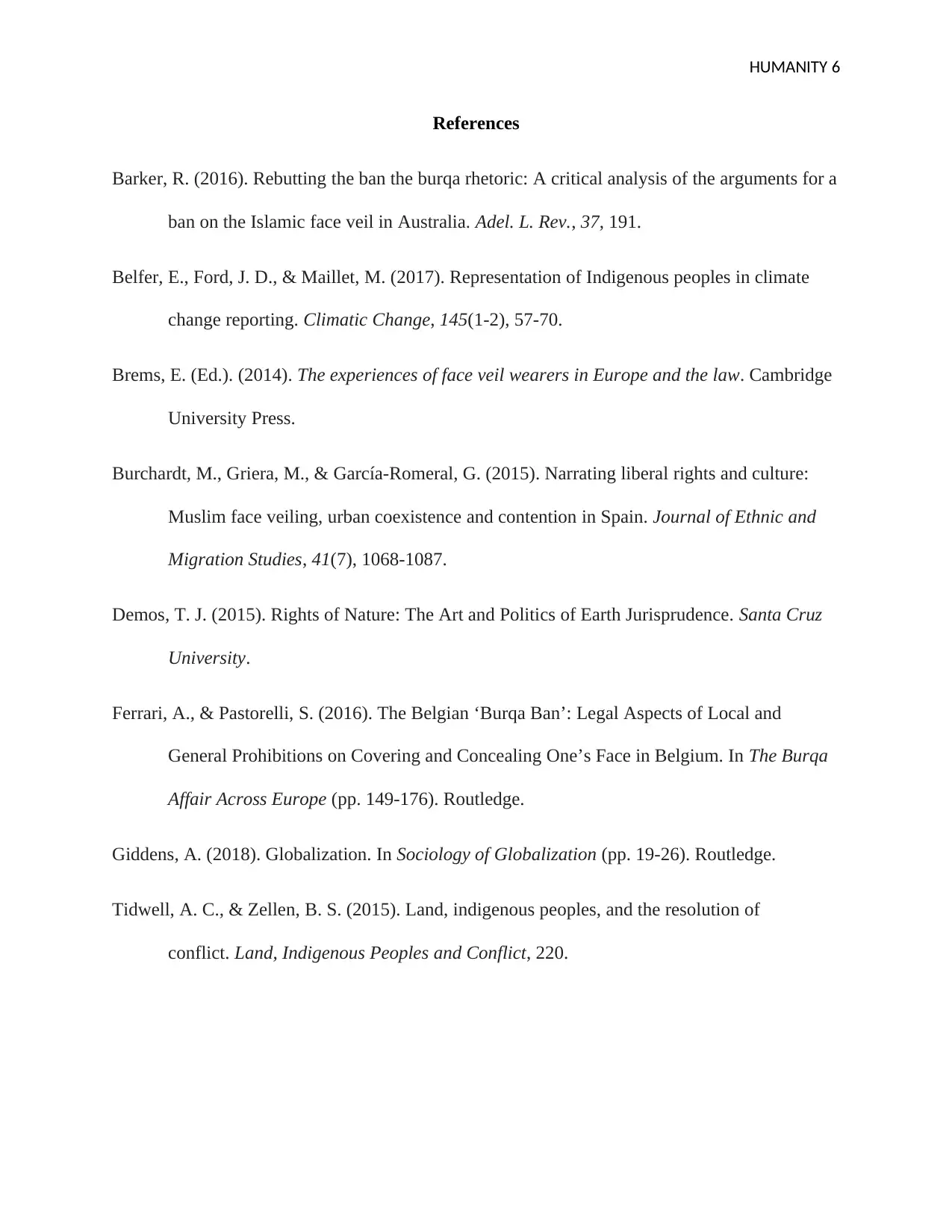
HUMANITY 6
References
Barker, R. (2016). Rebutting the ban the burqa rhetoric: A critical analysis of the arguments for a
ban on the Islamic face veil in Australia. Adel. L. Rev., 37, 191.
Belfer, E., Ford, J. D., & Maillet, M. (2017). Representation of Indigenous peoples in climate
change reporting. Climatic Change, 145(1-2), 57-70.
Brems, E. (Ed.). (2014). The experiences of face veil wearers in Europe and the law. Cambridge
University Press.
Burchardt, M., Griera, M., & García-Romeral, G. (2015). Narrating liberal rights and culture:
Muslim face veiling, urban coexistence and contention in Spain. Journal of Ethnic and
Migration Studies, 41(7), 1068-1087.
Demos, T. J. (2015). Rights of Nature: The Art and Politics of Earth Jurisprudence. Santa Cruz
University.
Ferrari, A., & Pastorelli, S. (2016). The Belgian ‘Burqa Ban’: Legal Aspects of Local and
General Prohibitions on Covering and Concealing One’s Face in Belgium. In The Burqa
Affair Across Europe (pp. 149-176). Routledge.
Giddens, A. (2018). Globalization. In Sociology of Globalization (pp. 19-26). Routledge.
Tidwell, A. C., & Zellen, B. S. (2015). Land, indigenous peoples, and the resolution of
conflict. Land, Indigenous Peoples and Conflict, 220.
References
Barker, R. (2016). Rebutting the ban the burqa rhetoric: A critical analysis of the arguments for a
ban on the Islamic face veil in Australia. Adel. L. Rev., 37, 191.
Belfer, E., Ford, J. D., & Maillet, M. (2017). Representation of Indigenous peoples in climate
change reporting. Climatic Change, 145(1-2), 57-70.
Brems, E. (Ed.). (2014). The experiences of face veil wearers in Europe and the law. Cambridge
University Press.
Burchardt, M., Griera, M., & García-Romeral, G. (2015). Narrating liberal rights and culture:
Muslim face veiling, urban coexistence and contention in Spain. Journal of Ethnic and
Migration Studies, 41(7), 1068-1087.
Demos, T. J. (2015). Rights of Nature: The Art and Politics of Earth Jurisprudence. Santa Cruz
University.
Ferrari, A., & Pastorelli, S. (2016). The Belgian ‘Burqa Ban’: Legal Aspects of Local and
General Prohibitions on Covering and Concealing One’s Face in Belgium. In The Burqa
Affair Across Europe (pp. 149-176). Routledge.
Giddens, A. (2018). Globalization. In Sociology of Globalization (pp. 19-26). Routledge.
Tidwell, A. C., & Zellen, B. S. (2015). Land, indigenous peoples, and the resolution of
conflict. Land, Indigenous Peoples and Conflict, 220.
⊘ This is a preview!⊘
Do you want full access?
Subscribe today to unlock all pages.

Trusted by 1+ million students worldwide
1 out of 6
Related Documents
Your All-in-One AI-Powered Toolkit for Academic Success.
+13062052269
info@desklib.com
Available 24*7 on WhatsApp / Email
![[object Object]](/_next/static/media/star-bottom.7253800d.svg)
Unlock your academic potential
Copyright © 2020–2026 A2Z Services. All Rights Reserved. Developed and managed by ZUCOL.





